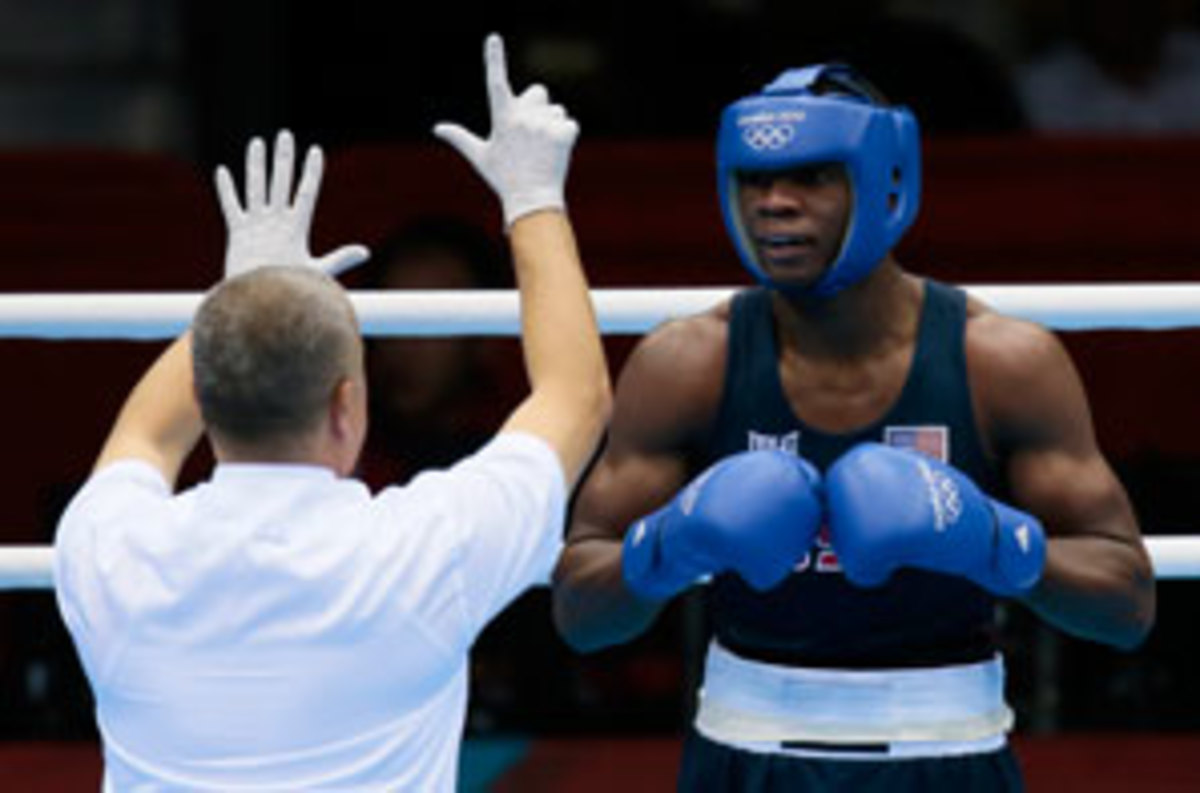Browne's Olympic dream ends nearly before it can begin
LONDON -- Marcus Browne draped the blood-stained towel over his head, tugging at it occasionally to wipe slow trickling beads of sweat away from his eyes. For Browne, a light heavyweight medal contender, the Olympic journey was over, abruptly ending in a 13-11 opening-bout defeat to Australia's Damien Hooper that Browne was still trying to digest.
"I didn't listen to my corner," Browne deadpanned. "My corner told me more speed, less power and I didn't listen."
To understand the pain an Olympic athlete like Browne feels after a defeat, one must first understand what it took for him to get there. Growing up on Staten Island, N.Y., Browne was a self described troublemaker. He hung out with the wrong crowd, made plenty of wrong decisions. He picked up boxing at 13, and it was his salvation. It kept him off the streets and in the gym. Maybe, it kept him alive.
Boxing didn't come easy. The first time Browne got in the ring, he got hit with a body shot, went down, and cried. But he worked at it, slowly developing speed and power while sculpting his 6-foot-2, 172-pound frame. He won the first of three New York Golden Gloves titles in 2008 and picked up a national championship at light heavyweight last March.
Browne was ready for the Olympics, in every possible way. In the weeks leading up to London, USA coaches needed to replenish Browne's sparring partners regularly because he was dispatching them so quickly. Once here, Browne took a leadership role with the team. When asked in interviews which U.S. boxer had the best chance at gold, he answered "Marcus Browne." When asked who he wanted to face in the first round, he called out Russia's Egor Mekhontsev, a medal favorite and the man who beat Browne in the 2011 World Championships.
Yet against Hooper, that confidence appeared to vanish. Browne was aggressive early in the first round, tagging Hooper with a looping overhand right just after the opening bell, a shot that helped him squeeze out an early 4-3 lead. But in the second round he was sluggish, dancing instead of engaging, pawing his jab at Hooper instead of snapping it and following it up. The judges scored the round even, 3-3, and even that seemed generous.
"I was a little nervous," Browne said.
Both Browne and Hooper opened the third round aggressive but it was Hooper landing the cleaner shots. A mid-round flurry drew a standing eight count for Browne from the referee, and from there Hooper dictated the action, forcing Browne on the defensive, taking him out of his game.
"I was in control," Hooper said. "I could see in his eyes and his body language that he didn't want to be there."
That's debatable, though it's apparent that, against Hooper, Browne fought the wrong fight. From his seat in the stands, Browne's personal coach, Gary Stark Sr., fumed as he watched his star pupil fight cautiously, ducking in and out of flurries.
"If you have a guy who can punch like Marcus, why are you having him run around like that?" Stark said. "I would have grabbed his headgear and said, 'Yo Marcus, let's go. Bone up and go.' Marcus is a power puncher. He can stand in there and crack. He goes head to head with that kid, he is the stronger kid. Don't play that little points system game. Go after him. Go get this guy."
Browne called the loss a learning experience, one he expects to bounce back from. He plans on staying in London -- I'm going to stay here and support my team," Browne said -- but for him, the Olympics are finished. It's off to the pro ranks, off to a different style of fighting, off to a different future that, he hopes, will bring much different outcomes.






